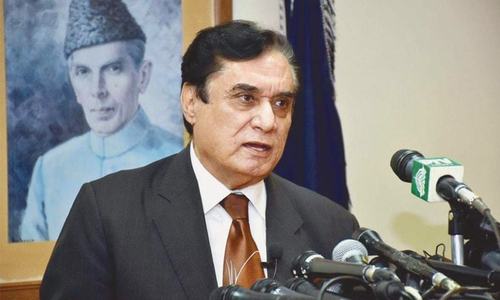The draft bill for amendments to the National Accountability Ordinance, 1999 — also known as the NAB (National Accountability Bureau) law — is ready to be tabled in the parliament and includes a provision for private citizens unconnected to holders of public offices to be excluded from the reach of the accountability watchdog, Dawn.com has learnt.
"The application of the NAB laws may not be extended in respect of a private person or entity, who/which is directly and indirectly unconnected with a holder of public office," reads the third proposed amendment to the law.
The decision to strip NAB of powers to probe private citizens was announced by the government on August 22 in a press conference by Federal Minister for Law and Justice Dr Farogh Nasim.
The draft, a copy of which was obtained by DawnNewsTV, details 10 other proposals.
It proposes that the trial or accountability courts "may be conferred the power of entertaining and deciding pre-arrest and after-arrest bail applications".
Under the existing NAO of 1999, there is no provision for grant of bail to a NAB suspect; as a result, a suspect has to file a petition under Article 199 of the Constitution with the high court to seek bail. A citizen can invoke Article 199 and file a petition with the concerned high court to enforce fundamental rights when there is no remedy available under the law.
The draft also proposes amendments pertaining to the voluntary return of an embezzled amount and release of a person under a plea bargain. As such, it suggests:
(i) The voluntary return may be approved by a committee formed by the prime minister. (ii) Guidelines to be formed for entertaining a request for voluntary returns and plea bargains. (iii) The acceptance of a plea bargain and voluntary return may see the public office holder disqualified to hold office or employment for a period of 10 years or any other period.
Furthermore, "a threshold of Rs500 million may be introduced," the draft suggests.
Under the amended law, the valuation of immovable properties is to be reckoned either as per the District Collector rate or the Federal Board of Revenue (FBR) rate, whichever is higher.
The new NAB law will also take into consideration that lapses by officials do occur and will not categorise them as offences.
"NAB shall not take cognizance of offences based on procedural lapses" unless there is evidence corroborating that the "officer has materially benefitted from such a decision or lapse", reads the proposed amendment.
Referring to the section in the existing law pertaining to 'misuse of authority', the new law says that the act will only be congnizable if there is an underlying criminal intent and the action results in an illegal or unjustifiable increase in the assets of a government servant.
Furthermore, a government servant's assets will not be frozen solely on account of a belief that they have committed an offence. "The property shall be frozen once the officer has been convicted by the court," according to the draft amendment.
The amended law will also see an arrested accused released on bail if an inquiry under the NAB ordinance is not concluded within a period of three months. Additionally, the previous 90-day physical custody period of an accused public office holder will be brought down to 45 days.
A case previously investigated by NAB and closed will not be reopened.
NAB authorities will also have a reduced jurisdiction in matters pertaining to taxation, stock exchange including IPOs and building control "because appropriate action can be taken by the FBR, SECP and Building Control Authorities".



































